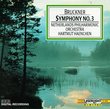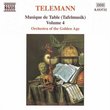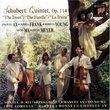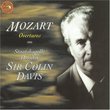| All Artists: Johannes Brahms, Anton Bruckner, Ludwig van Beethoven, Hugo [Composer] Wolf, Maurice Ravel, Johann II [Junior] Strauss, Rudolf Kempe, Berlin Philharmonic Orchestra, Royal Philharmonic Orchestra, Vienna Philharmonic Orchestra, Munich Philharmonic Orchestra Title: Great Conductors of the 20th Century: Rudolf Kempe Members Wishing: 1 Total Copies: 0 Label: EMI Classics Release Date: 8/5/2003 Album Type: Original recording remastered Genre: Classical Styles: Ballets & Dances, Ballets, Polkas, Chamber Music, Historical Periods, Classical (c.1770-1830), Modern, 20th, & 21st Century, Symphonies Number of Discs: 2 SwapaCD Credits: 2 UPC: 724357595025 |
Search - Johannes Brahms, Anton Bruckner, Ludwig van Beethoven :: Great Conductors of the 20th Century: Rudolf Kempe
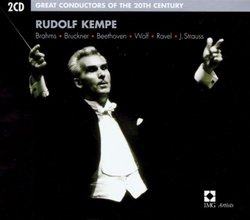 | Johannes Brahms, Anton Bruckner, Ludwig van Beethoven Great Conductors of the 20th Century: Rudolf Kempe Genre: Classical
|
Larger Image |
CD DetailsSimilar CDs
Similarly Requested CDs |
CD ReviewsSuperb collection, except for the Beethoven madamemusico | Cincinnati, Ohio USA | 12/31/2004 (4 out of 5 stars) "Rudolf Kempe was one of the conductors I admired most when growing up. Like Toscanini, he emphasized extreme clarity of his sections; unlike Toscanini, his performances sometimes lacked drama or tension. This is certainly the case with the rather flaccid Beethoven "Eroica" Symphony; it is not so much the slow tempos (Ansermet and Kletzki could sometimes make magic with slow tempos) as a phrase-by-phrase, disconnected trudge through the symphony. The rest of the recordings, however, are fabulous, especially the Bruckner 4th. I have never been a fan of Bruckner's music, having always found it dull, but Kempe (like Furtwangler before him) has found a way of finding the rhythmic cells that make Bruckner work. (Most modern conductors, alas, have no clue how to conduct Bruckner effectively. I thought Bruckner was a dull, pompous composer when listening to most other conductors perform his music!) Also of high quality in this set are the Brahms "Tragic Overture," Wolf "Italian Serenade," Ravel "Daphnis et Chloe Suite No. 2" and J. Strauss' "Lieber Blut" polka. In all of these, Kempe's fleetness, effervescence and exquisite transparency are all captured perfectly by the stereo sound. The "Eroica" sounds very leaden in the first and second movements, but the third is fleet and light, the pizzicato strings dancing fleetly as the winds and horns swirl around them. Overall, however, Kempe has left us much better Beethoven in his complete set." Get it for the Bruckner! Iyer | Bethesda, MD | 01/13/2004 (5 out of 5 stars) "I have not (yet) heard CD2, but the Bruckner Fourth on CD1 is splendidly fine. This, a live recording with the Munich Philharmonic, is a wonderfully measured interpretation from a much underrated conductor. How beautifully Kempe draws out the leitmotiv in the opening movement, and what sublime playing by the solo horn! The andante is uncommonly fine (the solo flute plays like Pan himself!) and holds its own against, if not surpasses, any other recording, live or otherwise.I have no hesitation in recommending this CD very highly. It has a modest asking price for so fine a Bruckner Fourth." Rare document:Kempe's Bruckner Sym 4 Dan Fee | Berkeley, CA USA | 10/01/2003 (5 out of 5 stars) "Now that he is no longer alive, Mr. Kempe has been forgotten by the busy marketing mavens who always inflate their magical influences upon what we see, what we hear, and what we think or feel. In the case of Rudolf Kempe, this set only proves that classical music can have incredibly powerful impacts, even if the musicians in question have not been reduced to the household name of the moment, that flash point of Andy Warhol's "Fifteen minutes of fame." Having long cherished Kempe's complete traversal of the Richard Strauss orchestral music, recorded for EMI and first issued on vinyl; I approached this two-CDs-for the price of one set with interest. Could there be archived performances of Kempe that were worth reissuing? Well, the answer from this set is: yes, and no. The Bruckner Fourth Symphony is clearly a live performance; but almost from it's very first phrase, as the first horn of the Munich Philharmonic Orchestra draws breath to begin that famous opening motif; you may find yourself spellbound. Kempe's Bruckner is slow. Like older generation conductors, he could set a tempo and make it strengthen, rather than drag out, the music's story-telling. Rather than spell things out, halting phrase by phrase, however, Kempe is able to lay out huge paragraphs of drama and unfolding architecture. This kind of style is exactly how I love to hear my Bruckner; full of nuance without breaking the powerful overall forward progress. By the end of disc one, I was completely happy I had acquired this set. I also was reminded that the Munich Philharmonic had a tradition of performing Bruckner, long before Segiu Celibidache arrived on the scene to make his controversial-celebrated Bruckner recordings (again for EMI). Since I already grabbed the surround SQ sound release of the complete Beethoven symphonies, also with the Munich Philharmonic; I was less urgently needy or curious about the Beethoven Third Symphony on disc two. When I did get around to it, a few days later, I was disappointed. Although the liner commentary writer gives this version of the third high praise; I find it lacking, and worse, quite labored. The slowish tempo, and phrase by phrase drama that one feared would occur in the Bruckner Fourth are audibly in evidence in this reading of the Beethoven Third. Fortunately, other recordings exist that show us what Kempe could do with Beethoven on a good day, so the poor showing on disco two of this set is not a final reason to completely avoid it. Five stars for the Bruckner Fourth; Four stars for the rest, except One star for the Beethoven Third Symphony. Recommended, primarily for the compelling Bruckner Fourth Symphony."
|

 Track Listings (5) - Disc #1
Track Listings (5) - Disc #1


